《Workingtheland》教案1全面版
【教学设计】高中英语高二必修四《Workingtheland》精品教案

五.Teaching Important Points(教学重点)
(1) Get students to listen and understand the listening material.
(2) Get students to learn how to persuade others by using the functional items for persuasion
六.Teaching Difficult Points(教学难点)
(1) Get students to learn to design a poster by advertising the safety and imporance of eating “green food”.
二、教材分析
本节课是人教新课标必修4 Unit2 Working the land(warming up reading)内容,学生在extensive reading部分已了解了“Chemical or Organic Farming?”的有关情况,为本节课的听说读写训练作了铺垫。虽然学生对chemical farming和organic farming有了一定的理解,但是要求他们把相关内容用英语表达出来仍有一定的难度。本节课的目的是让学生通过听、读活动,从语言材料中获取相关的信息,并通过对信息的加工和处理,提高他们的说、写能力。
七.Teaching Methods(教学方法)
1.Task-based method(任务型教学法)
高中英语Unit 2 Working the land教案1 新课标 人教版 必修4
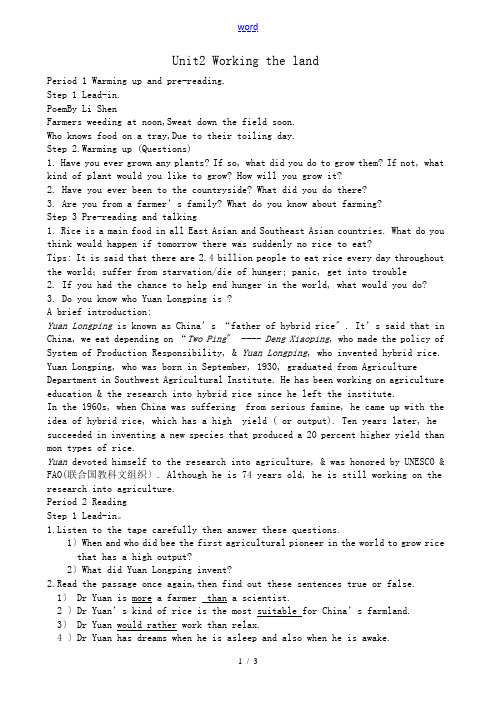
Unit2 Working the landPeriod 1 Warming up and pre-reading.Step 1 Lead-in.PoemBy Li ShenFarmers weeding at noon,Sweat down the field soon.Who knows food on a tray,Due to their toiling day.Step 2.Warming up (Questions)1. Have you ever grown any plants? If so, what did you do to grow them? If not, what kind of plant would you like to grow? How will you grow it?2. Have you ever been to the countryside? What did you do there?3. Are you from a farmer’s family? What do you know about farming?Step 3 Pre-reading and talking1. Rice is a main food in all East Asian and Southeast Asian countries. What do you think would happen if tomorrow there was suddenly no rice to eat?Tips: It is said that there are 2.4 billion people to eat rice every day throughout the world;suffer from starvation/die of hunger; panic, get into trouble2. If you had the chance to help end hunger in the world, what would you do?3. Do you know who Yuan Longping is ?A brief introduction:Yuan Longping is known as China’s “father of hybri d rice〞. It’s said that in China, we eat depending on “Two Ping〞 ---- Deng Xiaoping, who made the policy of System of Production Responsibility, & Yuan Longping, who invented hybrid rice. Yuan Longping, who was born in September, 1930, graduated from Agriculture Department in Southwest Agricultural Institute. He has been working on agriculture education & the research into hybrid rice since he left the institute.In the 1960s, when China was suffering from serious famine, he came up with the idea of hybrid rice, which has a high yield ( or output). Ten years later, he succeeded in inventing a new species that produced a 20 percent higher yield than mon types of rice.Yuan devoted himself to the research into agriculture, & was honored by UNESCO & FAO(联合国教科文组织〕. Although he is 74 years old, he is still working on the research into agriculture.Period 2 ReadingStep 1 Lead-in。
高中英语《Unit 2 Working the land1》优质课教案、教学设计

教学设计PRE-READING 部分运用诗歌Digging 和饥荒视频导入主题:运用一首小诗导入,吸引学生眼球,激发学生兴趣,继而讨论农民及粮食问题。
然后运用视频让学生了解世界其他国家和地区的饥荒问题。
由此激发学生对世界的关注,培养学生的同情心。
进而过渡到致力于解决全球饥荒问题的伟大科学家——袁隆平。
READING 部分介绍中国著名的农业科学家袁隆平的生平和他的杂交水稻。
第一段描述了袁博士的外表——他更象一个农民而不象一个科学家,农村就是他做科研的殿堂。
同时介绍了他取得的成就:超级杂交水稻。
第二段描述他的家庭出身,学业,献身水稻科研的原因及取得的进展。
第三段告诉我们袁博士过着跟普通人一样的生活却干着伟大的事业。
即使在功成名就之后,他也淡泊名利, 有着无私奉献的高尚精神。
第四段讲袁隆平的工作理想和目标,以及他热爱人民和为人民不断进取的精神。
(在READING 部分设计问题,让学生根据课文中理解和收集的信息做出理解,检验他们的理解力和训练他们的归纳总结能力。
)POST-READING 部分主要是对文章进行总结,同时进行情感升华,开展德育教育。
首先结合图片和提示引导学生根据课文完成袁隆平的简介。
通过图片介绍历届国家最高科学技术奖得主,引导学生热爱祖国,献身科学,不屈不挠的精神。
进而引导学生讨论并分享自己心中最敬佩的人,引导学生学会感恩并发挥榜样的作用。
然后分享我自己敬佩的“人”——郯城一中女足。
激发学生的热情和动力。
最后进行升华并布置作业——将刚刚讨论的“我最敬佩的人”写在作文本上,同时预习下一篇文章。
具体教学过程如下:Step 1: Pre-readingT: Class begins !S: Good afternoon teacher !T: Good afternoon everyone ! Glad to see you again ! First of all, would you please enjoy a beautiful poem with me ?S: Yes.T: OK. (Play the poem Digging written by Seamus Heaney.)What kind of picture does this poem describe ?S: Farmers. Work the land ……T: 1. The poet used his father and grandfather as examples to describe a vivid picture of the hard-working farmers. (Show some pictures of farmers working the land.) Have you ever thought about this : They work hard for what purpose ?S: Earn their living. Make money ……T: Yes. And as you can see, farmers work the land hard. So we will have food to eat. Yes or no ?S: Yes !T: Because food is the most basic and important thing in life. As a saying goes : Eating is the no.1 need in life. So they are very important and necessary. Do we need to worry about hunger ?S: No!T: Of course we don’t need to. However, there are a lot of people in the world have to suffer from hunger and have no food to eat. Let’s watch a short video to have a look.T: It’s very terrible and frightening. Think about this : What would happen if tomorrow there is no rice to eat ?S: Death. War. Disease ……T; You are right. Thanks to a great man, the risk has been decreased a lot. Do you know who he is ?S: Yuan Longping.T: You got it. It is Dr. Yuan Longping. What do you know about him ?S: Scientist. Old. Famous……T: Do you want to learn more about the great man ?S: Yes !Step 2: ReadingT: Great ! let’s move to the first passage in unit 2. What’sthe title ?S: A pioneer for all people.T: Good job. From the ppt we can see this passage can be divided into four parts. Please read the passage as quickly as you can. And then match the right main idea with its right paragraph. Are you clear ?S: Yes.T: Do you still remember how to find out the main idea quickly ? Focus on the first and last sentence in each paragraph. Understand ?S: Yes.T: Let’s do it !T: Did you get the answer ?S: Yes.T: OK. Let’s have a check.S:1. Para.1 is Dr Yuan’s appearance and achievement.2.Para.2 is Main events of Dr Yuan.3.Para.3 is Dr Yuan’s personalities.4.The last paragraph is Dr Y uan’s dreams.T: Do you agree ?S: Yes.T: Good job ! Since we have learned the structure and basic information about this passage. Now let’s move to details. First, let’s come to para. 1. And answer this question : What does Dr Yuan look like ? Does Dr. Yuan wear sunglasses? Wear a suit and tie ? Does he always sit in the lab and do his research ? Does he often give speeches and attend meetings ? Read para.1 and try to find out theanswer. Clear ?S: Yes.T: Go !T: Have you finished ?S: Yes.T: Very good. Let’s have a c heck.S:1. Sun-burnt face and arms2.Slim and strong body3.Just like a Chinese farmerT: Well done. While you are reading, did you find out the achievement Dr. Yuan has made ?S: He grows what is called super hybrid rice.T: Yes or no ?S: Yes.T: You got it ! Apart from this achievement, he has a lot of awards and achievements ? He is the man who touches China in 2004. He got the Highest Science and Technology Awards, Lifetime Achievement Award and etc. Successful and great. OK. Let’s move to next part. Please read para. 2 carefully and fill in the chart. On the left are times and the right areimportant events. Understand ?S: Yes.T: Let’s go.T: Did you get it ?S: Yes.T: Good. Who want to share answers with us ?S: In 1930 he was born. In 1953 he graduated from Southwest Agriculture College. In recent years, 200 million tons of rice produced.T: Do you agree ?S:Yes !T: Well done. Next one.S: As a young man, hunger was a great problem and he saw the great need for increasing the rice output.T: Yes or no ?S:Yes !T: Good job. The last one.S: Now He is circulating his knowledge.T: Perfect ! From this events we can see Yuan Longping has a sense of responsibility and is willing to struggle for his people. He is like the sun, giving us sunshine to grow and develop. OK. Let’ move to next part. Para. 3 describes Dr.Yuan’s personalities. We can learn from these three aspects : his attitude to life, fame and money , research. Please read para. 3 carefully and find out the sentences about his attitude. Clear ?S:Yes !T: Good. Reading time begins.T: Hve you got the answer ?S:Yes !T: Any volunteers ?S: He is satisfied with his life. And he has various hobbies.T: Well done. What hobbies does he have ?S: He enjoys listening to violin music, playing mah-jong, swimming and reading.T: Show some pictures. Sometimes we do need to balance our work and relaxation. What about his attitude to fame and money ?S: He doesn’t care about being famous and think little of money.T: Yes or no ?S:Yes.T: Well done. The last one. Attitude to research ?S: He gives a lot of money to equip others for their research in agriculture.T: You all did a very good job ! Just as I always told you : work hard, play hard. We all have dreams. So is Yuan Longping. Do you want to know his dreams ?S:Yes.T: Read para. 4 carefully and you’ll know. Now please read and find out.T: Finished ?S:Yes.T:Great. Volunteers ?S: He want to produce a kind of rice that could feed more people.T: Do you know what kind of rice ?S: As tall as sorghum. Each ear as big as an ear of corn and each grain was huge as peanut.T: You got it ! One dream is not always enough, especially for a person who loves and cares for his people. So what’s Dr. Yuan’s second dream ?S: He wants to export his rice so that it can be grown around the globe.Step 3: Post-readingT: What a great man ! He devoted his time and energy to improving our lives not just focusing on himself. He is absolutely selfless ! And I think he deserves our respect. Until now, we have fully understand this passage and Dr. Yuan.Can you finish his resume ?Name:Nationality:Birthday:Occupation:Education:Hobby:Dream:Achievement:……S: ( Answer together)T: I’ll show you a video about Yuan Longping. Let’s have awatch. Usually, we are so familiar with pop stars and pay less attention to those great scientists like Dr. Yuan. (Show pictures of spme popular stars and winners of the Highest Science and Technology Awards ) They are the most popular scientist group of China. They are the ones we should admire and respect. So we have another task. Describe a person that you admire and respect. Discuss and share the story with your partners. Here are some tips: who, what, why, when, where, how…T: Any volunteers ? Share your story with us.S: (Sharing time)T: Do you know who I admire and respect ? it is not a person but a team. Please watch this video.( women football team of Tan Cheng no.1 middle school) Just as you see, they are as young as you, work hard and have got a lot of awards.They fight for honor. They never give up. They are common and they are great. They are our examples. In the last , I have some words for all of you: “Do it , not just say it. Be grateful to the world. Learn to take responsibilities. Be devoted to what you have chosen. ” And then, just as the song sings : to be a better man. As a teacher, I will do whatever I can to help you make more progress both in your study and mind. As students, I hope you have a determined goal and try your best to realize it ! Do you believe in yourself ?S: Yes !Step 4: HomeworkT: Me too. OK. Time is up. Let’s see our homework today. 1. Write a passage about the person that you admire and respect. 2. Preview the next passage. Are you clear ?S: Yes !T: Well done ! Thanks for your cooperation and listening. Class is over. Thank you all !S: Goodbye teacher !T: See you next time !。
高中英语Workingtheland学案教案
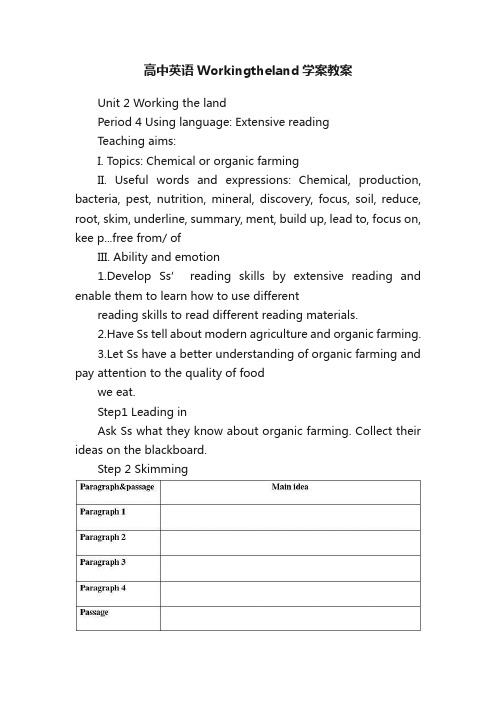
高中英语Workingtheland学案教案Unit 2 Working the landPeriod 4 Using language: Extensive readingTeaching aims:I. Topics: Chemical or organic farmingII. Useful words and expressions: Chemical, production, bacteria, pest, nutrition, mineral, discovery, focus, soil, reduce, root, skim, underline, summary, ment, build up, lead to, focus on, kee p...free from/ ofIII. Ability and emotion1.Develop Ss’ reading skills by extensive reading an d enable them to learn how to use differentreading skills to read different reading materials.2.Have Ss tell about modern agriculture and organic farming.3.Let Ss have a better understanding of organic farming and pay attention to the quality of foodwe eat.Step1 Leading inAsk Ss what they know about organic farming. Collect their ideas on the blackboard.Step 2 SkimmingStep 3 Scanning1 Ask Ss to scan the passage to locate particular information and answer the following questions inStep 4 Careful readingAsk Ss to read the passage carefully and then write a summary of the passage following the procedure in Exercise 3.1).What is organic farming?2).What problems are caused by using chemical fertilizers?3).Why do organic farmers grow peas or soybeans after corn or wheat?Step 5 RetellingNow please retell the text according to the following chart, you can discuss in groups. Organicfarming1.Crops growing with natural fertilizers.2.Farmers prefer natural waste from animals.①make...richer and more fertile①leaving...is not good②reduce...and help...strong②grow...year after year③the fertilizers kill...and healthy④keep free...from chemicalsStep 6 Language pointsTeacher explains the important words and expressions from the reading. Try to use as many examples as possible to illustrate the point. After illustration, teacher can give students some exercise to consolidate their understanding.Language Points1. Many farmers weled them as a great way to stop crop disease and increase production.很多农民喜欢使用化肥,把化肥作为防止农作物病虫害和提高产量的重要手段。
Unit 2 Working the land 教学设计 教案
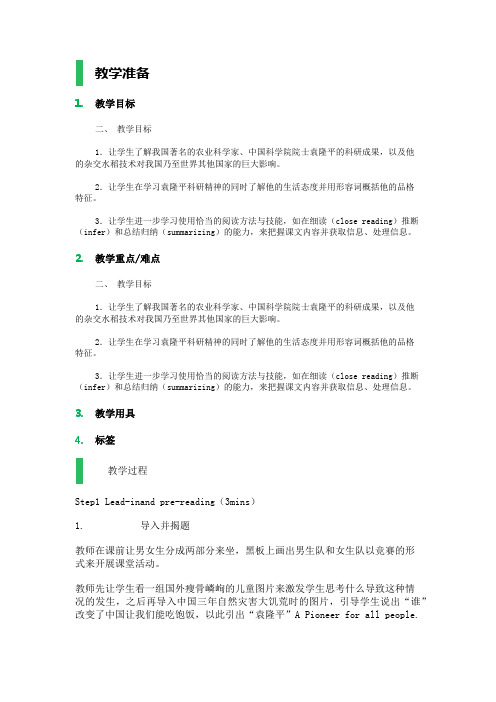
教学准备1. 教学目标二、教学目标1.让学生了解我国著名的农业科学家、中国科学院院士袁隆平的科研成果,以及他的杂交水稻技术对我国乃至世界其他国家的巨大影响。
2.让学生在学习袁隆平科研精神的同时了解他的生活态度并用形容词概括他的品格特征。
3.让学生进一步学习使用恰当的阅读方法与技能,如在细读(close reading)推断(infer)和总结归纳(summarizing)的能力,来把握课文内容并获取信息、处理信息。
2. 教学重点/难点二、教学目标1.让学生了解我国著名的农业科学家、中国科学院院士袁隆平的科研成果,以及他的杂交水稻技术对我国乃至世界其他国家的巨大影响。
2.让学生在学习袁隆平科研精神的同时了解他的生活态度并用形容词概括他的品格特征。
3.让学生进一步学习使用恰当的阅读方法与技能,如在细读(close reading)推断(infer)和总结归纳(summarizing)的能力,来把握课文内容并获取信息、处理信息。
3. 教学用具4. 标签教学过程Step1 Lead-inand pre-reading(3mins)1. 导入并揭题教师在课前让男女生分成两部分来坐,黑板上画出男生队和女生队以竞赛的形式来开展课堂活动。
教师先让学生看一组国外瘦骨嶙峋的儿童图片来激发学生思考什么导致这种情况的发生,之后再导入中国三年自然灾害大饥荒时的图片,引导学生说出“谁”改变了中国让我们能吃饱饭,以此引出“袁隆平”A Pioneer for all people.T: Let’s look at somepictures on the screen and tell me what problem they show? … What aboutChina?….Who saved us and helped us solve the problem of hunger?2. 介绍文体教师让学生在读前猜测文章的文体是什么,并简单解释人物传记。
Unit 2 Working the land 教案1
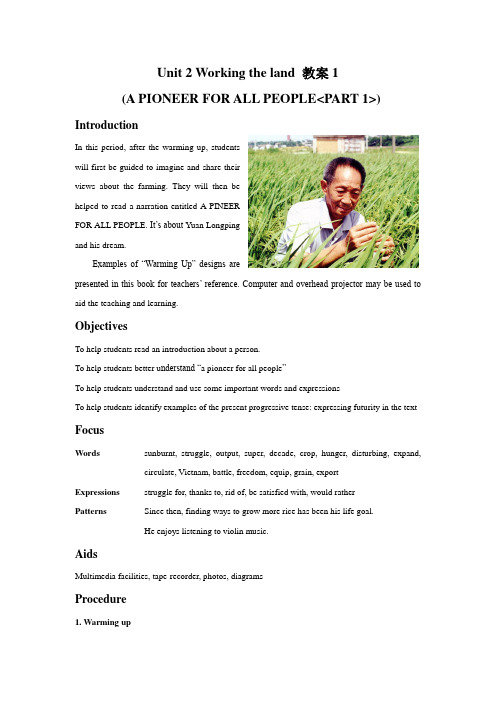
Unit 2 Working the land 教案1(A PIONEER FOR ALL PEOPLE<PART 1>) IntroductionIn this period, after the warming up, studentswill first be guided to imagine and share theirviews about the farming. They will then behelped to read a narration entitled A PINEERFOR ALL PEOPLE. It’s about Yuan Longpingand his dream.Examples of “Warming Up” designs arepresented in this book for teachers’ reference. Computer and overhead projector may be used to aid the teaching and learning.ObjectivesTo help students read an introduction about a person.To help students better u nderstand “a pioneer for all people”To help students understand and use some important words and expressionsTo help students identify examples of the present progressive tense: expressing futurity in the text FocusWords sunburnt, struggle, output, super, decade, crop, hunger, disturbing, expand, circulate, Vietnam, battle, freedom, equip, grain, exportExpressions struggle for, thanks to, rid of, be satisfied with, would ratherPatterns Since then, finding ways to grow more rice has been his life goal.He enjoys listening to violin music.AidsMultimedia facilities, tape-recorder, photos, diagramsProcedure1. Warming up(1)Warming up by discussingGood morning, class. Have you ever been to the countryside? What did you see or do here? Are you from a farm’s family? What do you know about farming? Have you ever grown any plants? If so, what did you do to grow them? If not, what kind of plant would you like to try growing? How would you grow it? Now look at the following pictures and discuss it in pairs.(2)Warming up by asking and answeringNow suppose you live in countryside. You plan to grow some plant. Do you know how to do? Please have a short discussion with your partners.Ok, now I’d like you to ask your partner the following questions.2. Pre-reading by talking and sharing1) What is the main food in all East Asian and Southeast Asian countries?(Rice. It is said that there are 2.4 billion people to eat rice every day throughout the world.)2) What do you think would happen if tomorrow there was suddenly no rice to eat?(If that happened, people there would suffer from starvation. People would be panic(惊慌) and the whole country would get into trouble.)3. Reading aloud to the recording.Today we’re going to read a passage about A PINEER FOR ALL PEOPLE . Please listen and read aloud about the recording of the text A PINEER FOR ALL PEOPLE on page 10. Pay attention to the pronunciation of each word and the pauses within each sentence. I will play the tape twice and you shall read aloud twice, too.4. Reading and underliningNow please read and underline all the useful expressions or collocations in the passage. Copy them to your notebook after class as homework.5. Reading aloud once again and understandingNext we are going to read aloud the text once again and then answer some questions.1) What does Dr. Yuan look like?(He has a sunburnt face and arms and a slim, strong body. He is more like a farmer than a scientist.)2) What’s his achievement?(He grows what is called super hybrid rice, which makes it possible to produce one-third more of the crop in the same fields. Using his hybrid rice farmers ’ producing harvests twice as large as before.)3) What do you think of him?(He doesn’t like money because he gives millions of yuan to equip others for their research in agriculture. He doesn’t like fame too though he has made great contributions to the world. He’s really respectable.)6. Reading and summing upWe shall go over the text once more to complete the chart below.Type of writing and summary of the idea7. Making a diagram of the textNext try to turn out a biograph of Yuan Longping.8. Discussing in groupsIf you had the chance to do something to help end hunger in the world, what would you do ?9.Homework1) Writing practiceWrite a short biography about Dr.Y uan (130 words, a writing plan is required.)2) Learned the words by heart.3)。
《Working the land》教案全面版
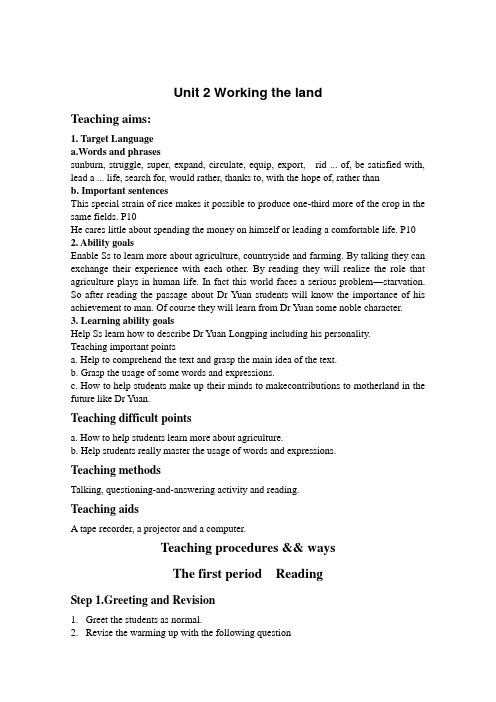
Unit 2 Working the landTeaching aims:1. Target Languagea.Words and phrasessunburn, struggle, super, expand, circulate, equip, export, rid ... of, be satisfied with, lead a ... life, search for, would rather, thanks to, with the hope of, rather thanb. Important sentencesThis special strain of rice makes it possible to produce one-third more of the crop in the same fields. P10He cares little about spending the money on himself or leading a comfortable life. P10 2. Ability goalsEnable Ss to learn more about agriculture, countryside and farming. By talking they can exchange their experience with each other. By reading they will realize the role that agriculture plays in human life. In fact this world faces a serious problem—starvation. So after reading the passage about Dr Yuan students will know the importance of his achievement to man. Of course they will learn from Dr Yuan some noble character.3. Learning ability goalsHelp Ss learn how to describe Dr Yuan Longping including his personality.Teaching important pointsa. Help to comprehend the text and grasp the main idea of the text.b. Grasp the usage of some words and expressions.c. How to help students make up their minds to makecontributions to motherland in the future like Dr Yuan.Teaching difficult pointsa. How to help students learn more about agriculture.b. Help students really master the usage of words and expressions.Teaching methodsTalking, questioning-and-answering activity and reading.Teaching aidsA tape recorder, a projector and a computer.Teaching procedures && waysThe first period ReadingStep 1.Greeting and Revision1.Greet the students as normal.2.Revise the warming up with the following questionHow do you think to grow our main food--rice?-----1)First, the farmers plow the field. They have to make the soil loose enough to plant crops.2)Second,grow some young plants3)Third, they insert the young plants into the loose field.4)At last ,they will get the harvestStep 2 Pre-reading1 Ask the following questions1).What’s the main food in Canada and USA:----- potatoes and bread2).What is the main food in South America:----- corn/maize3 )What is the main food in Southeast Asian countries:----- rice2 Show the students some pictures and ask the questionWhat is happening to these people in East Asian and Southeast Asian countries?Then show more news like that:International Facts on Hunger and Poverty (2002)1)Every 8 seconds, a child somewhere in the world dies from starvation.2)More than 800 million people in the world suffer from malnutrition (营养不良)---799 million of them are from the developing world. More than 153 million of them are under the age of 5.At last ask the students to discuss:If you had the chance to do something to help end hunger in the world, what would you do?Encourage the students to tell their opinions, Then give a conclusion:The only way to solve the food shortage problem is to increase the output of the grain crop per land area through the advancement of science and technology.3.lead the students to pay attention to the people---Yuan LongpingAsk : What do you know about him?--------Father of Hybrid RiceThen lead to the topic of the reading passage.A Pioneer For All PeopleStep 3 ListeningListen to the tape, try to find out some information of the hero.Name ____________Age ____________Job _____________Education _________Achievement _______Hobbies __________Step 4 Fast readingRead the passage quickly and answer the true-or- false questions• 1.Dr Yuan is more a farmer than a scientist.• 2. Dr Yuan’s kind of rice is the most suitable for China’s farmland.• 3.Dr Yuan would rather work than relax.• 4. Dr Yuan has dreams when he is asleep and also when he is awake.• 5. Dr Yuan enjoys a simple life than most rich and famous people. Step 5 Careful readingRead each paragraph and answer the following questions:Para 1:1.What dose Dr. Yuan look like? Why?2.What is his achievement?Para 2:1.Why did Dr. Yuan want to increase the rice output when he was young?2.How does he help rid the world of hunger?Para 3.41. What kind of life is Dr. Yuan leading?2.What is Dr Yuan’s dream?Step 6 Skimming:Step 7 Homework1.Learn the poemThe Peasants’ LotLi Shen (772-846)Farmers weeding at noon,Sweat down the field soon.Who knows food on a tray,Due to their toiling day?2. Finish the exercises in Learning about Language.3. Retell the text in about 150 words.Notes:a. Use the first person to retell the story.b. Try to use the proper conjunctions.The second period Learning about Language(The –ing form as the Subject & Object)AimsTo help students learn about The –ing form as the Subject & Object.To help students discover and learn to use some useful words and expressions.To help students discover and learn to use some useful structures.ProceduresI. Warming upWarming up reading aloud the text A PIONEER FOR ALL PEOPLELanguage is learned in context. So let’s first review the text learned yesterday by reading it aloud. Try to force out your English slowly and clearly.II. Discovering useful words and expressionsIn pairs do the exercises 1, 2 and 3 on pages 11 and 12. You must finish them in 5 minutes. III. Learning about grammar1. Read and identifyRead the text about Yuan Longping again, paying attention to the sentences which use the –ing form as the subject and object.In the sentence “Wishing for things, however, cost nothing. “the –ing is used as subject. It can be also used as object of the sentence. For example: Yuan Longping likes playing his violin.2. Consolidating by do exercisesTo consolidate your understanding you will be given 10 minutes to go over exercises 1,2,3,4and 5 on pages 12 and 13. You may just write on your text book. I mean the student’s book you are working by.III. Ready used materials for The –ing form as the Subject & Object)语法学习——动名词1. 动名词作主语1)名词直接放在句首作主语。
新课标模块4Unit2Workingtheland全单元教案(新课标版高一英语必修四教案教学设计)

新课标模块4Unit2Workingtheland全单元教案(新课标版高一英语必修四教案教学设计)教学过程: 1、组织教学(导言)nguage is learned in context. So let’s first review the text learned yesterday by reading it aloud. Try to force out your English slowly and clearlyII. Discovering useful words and expressionsIn pairs do the exercises 1, 2 and 3 on pages 11 and 12. You must finish them in 5 minutes.2.复习提问:3、讲授新课:III. Learning about grammar1. Read and identifyRead the text about Yuan Longping again, paying attention to the sentences which use the –ing form as the subject and object.In the sentence “Wishing for things, however, cost nothing. “the –ing is used as subject.It can be also used as object of the sentence. For example: Yuan Longping likes playing his violin.2. Consolidating by do exercisesTo consolidate your understanding you will be given 10 minutes to go over exercises 1,2,3,4 and 5 on pages 12 and 13. You may just write on your text book. I mean the student’s book you are working by.III. Ready used materials for The –ing form as the Subject & Object)语法学习--动名词1. 动名词作主语1)名词直接放在句首作主语。
人教版高中英语必修4《Unit 2 Working the land》教案
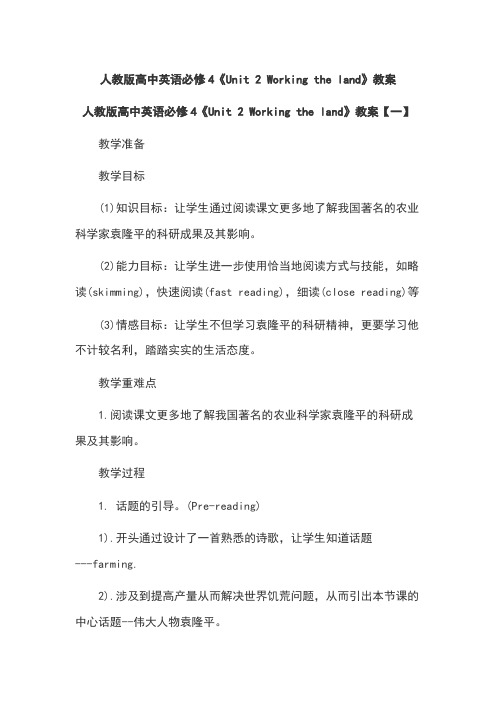
人教版高中英语必修4《Unit 2 Working the land》教案人教版高中英语必修4《Unit 2 Working the land》教案【一】教学准备教学目标(1)知识目标:让学生通过阅读课文更多地了解我国著名的农业科学家袁隆平的科研成果及其影响。
(2)能力目标:让学生进一步使用恰当地阅读方式与技能,如略读(skimming),快速阅读(fast reading),细读(close reading)等(3)情感目标:让学生不但学习袁隆平的科研精神,更要学习他不计较名利,踏踏实实的生活态度。
教学重难点1.阅读课文更多地了解我国著名的农业科学家袁隆平的科研成果及其影响。
教学过程1. 话题的引导。
(Pre-reading)1).开头通过设计了一首熟悉的诗歌,让学生知道话题---farming.2).涉及到提高产量从而解决世界饥荒问题,从而引出本节课的中心话题--伟大人物袁隆平。
2. 跟读与限时阅读完成导学案练习贯彻目的与困难策略,指导学生根据不同的阅读目的,在阅读的不同阶段,灵活使用各种阅读策略,捕捉文章主要信息,理解作者的写作意图,突破本文的教学重点与难点。
采用整体语言教学法和任务型语言教学法。
1)、通过限时阅读训练,引导学生如何利用略读(skimming)的方法把握文章的大意,侧重培养快速阅读理解能力和文章中心把握能力。
2)、精读各个段落语段,侧重培养快速捕捉文章重要细节的能力和猜测生词的能力,学会欣赏文章中的优美句子。
3:阅读过程--浅层次阅读。
(Reading I)1). 其中关于人物的基本信息中,通过设计了一个信息表格的浅层次阅读练习,对文中人物有了初步了解。
2). 关于他的梦想,书本上描写得非常生动,我让班里有艺术特长的学生画了一幅漫画,利用画面反映课文第四段所描述的内容,同时用第一人称配了声音效果。
4. 阅读过程--深层次阅读。
(Reading II)在处理了一些简单信息之后,阅读人物最重要的是要读出人物不同于其他人的成就以及值得学生学习的一些可贵品质。
必修UnitWorkingtheland教案

必修4U n i t2W o r k i n g t h e l a n dII. 目标语言分课时教案Period 1-2. New words learning & Warming up & Reading一、Teaching aimsKnowledge aims:1. Let the students learn and grasp new words and expressions of unit 5.2. Enable Ss to learn more about agriculture, countryside and farming.3. Enable the students to know the main idea of the passage.Ability aims:Develop the students` reading ability and let them learn to use some reading strategies such as skimming, scanning, and so on.Emotional aims:1. Let the students treasure what we have now, including rice ,friendship and so on.2. Develop the students’ spirit of cooperation and teamwork.二、Teaching important points1. Talk about the procedures of growing rice.2. Discuss the importance of rice.3. Let the students know the main idea of the passage.1. Understand how to grow rice.2. Discuss the question:What will life be like if we have no food to eat四、Teaching methods1.Skimming and scanning2.Asking-and-answering activity3.Individual, pair or group work to finish each task.4.Discussion.五、Teaching proceduresStep1. New words learning1.Ask the students to pronoun the new words of this unit and correct some of them.2.The whole class read the new words after the teacher.3.The whole class read the new words together.Step2. Lead-in and Warm ing Up1. Have you ever been to such a placeWhat did farmers usually do there---Farmers grow rice there.2.Do you know how to grow rice?Plow the fields, grow some young plants, insert the young plants into the fields, spray the agricultural chemicals, harvestT: That is how the rice comes from. We have learnt a poem about growing rice. Do you rememberS: Li shen Min NonT: Yes, you get it!Then show them the pictures about the poem:☐Farmers weeding at noon,☐Sweat down the field soon.☐Who knows food on a tray,☐Due to their toiling day.Step3. Pre-reading1.DiscussionGet the Ss to discuss the questions:What do you think would happen if tomorrow there was suddenly no rice to eatSuggested answer: starve to death.2. Conclusion:Suggested answer:Rice plays an important role in our life. We should treasure it and find more ways to produce more rice.3. Do you know how to solve this problem And who made a great contribution to solving this problem Suggested answer: Yuan LongpingStep4. Reading: A pioneer for all people1. SkimmingTask 1: Listen to the tape and try to fill in the following blanks.Name: Yuan LongpingAge:84 ( as of 2014)Nationality:ChineseOccupation:scientist/ farmerEducation:graduated from Southwest Agricultural College in 1953Dream:to export his hybrid rice so that it can be grown around the globeAchievement: in 1973, developed hybrid rice which produces 20% more than normal riceTask 2: According to the exercise one on Page 11, sum up the main idea of the passage.Summary: Yuan Longping, an ordinary person but a famous scientist, has been working hard to increase rice harvest without expanding the area of the field, helping China as well as the world get rid of hunger.2.ScanningTask 3: Finish the exercises book Page 27 Task2 金版学案学生用书27页1.Why does Yuan Longping work the landA. Because he was born into a farmer’s family.B.Because he needs to do his research on farming.C.Because he is interested in farming.D.Because he has a slim and strong body.2. According to the text, in 1950, Chinese farmers could produce only ______ tons of rice.A.20B.200C.56D.5003. The following are all Yuan Longping’s hobbies EXCEPT_______.A.Listening to violin musicB.Swimming and readingC.Playing mah-jongD.Smoking and drinking4.How does Yuan Longping’s feel about moneyA.Too much money can only bring more troubles than happiness.B.One has to own a large sum of money.C.Money is not important at all.D.One has to spend all his money on his own research.5. The whole passage mainly talks about______.A.how to sovle the world’s hunger problemB.how to increase rice harvests.C.Yuan Longping’s achievements in farmingD.Yuan Longping’s daily lifeSuggested answers: B CDACStep 5. DiscussionWhat advantages and disadvantages do you see in Yuan Longping’s life Would you like to have a life like his Why or why notStep6. Homework1.Copy the new words and learn the new words by heart.2.Learn the useful new words and expressions in this period by heart.Period 3-4 Language points一、Teaching aimsKnowledge aims:1. Get the students to learn and grasp some important new words and expressions.2. Get the students to understand some useful sentence patterns.The –ing form as the subjectSince then, finding ways to grow more rice has been his life goal.Spending money on himself or leading a comfortable life also means very little to him.The –ing form as the objectAs a young man, he saw the great need for increasing the rice output.Ability aims:1. Enable the students to use some useful words and expressions correctly.2. Enable the students to learn how to understand new words, expressions and difficult sentences according to the context.Emotional aims:Develop the students’ spirit of cooperation and teamwork.二、Teaching important pointsEnable the students to grasp the usages of some important new words ,expressions and difficult long sentences.三、Teaching difficult pointsHow to enable the students to grasp the usages of some important new words and phrases and understand some difficult long sentences.四、Teaching methods1. Discussing, summarizing and practicing.2. Cooperative learning.五、Teaching proceduresStep1. Lead-in1.Ask the students to read the new words together.2.Ask the students to read the passage paragraph by paragraph.Step2. Language points1. strugglev.挣扎;努力;拼搏;斗争n. (为争取自由、政治权利等而进行的)斗争,奋斗常用结构:struggle with与……斗争struggle for 为争取……而斗争struggle against与……斗争;为反对……而斗争struggle to do sth. (=make great efforts to do sth.)努力做某事struggle to one’s feet 挣扎着站起来eg:She struggled to keep back the tears. 她努力忍住泪水。
高中英语《Working the land》优质课教案、教学设计

Teaching important points【教学重点】
a.Help to comprehend the text and grasp the main idea of thetext.
-ty
Para4D. DrYuan’sappearance and hisachievement.
Task 3 Detailed reading
---Read the text again and according to every paragraph, please find out the information to solve the problems.
Step 2 While-Reading
Task1 skimming
--Find out the main idea of the text.
Whichofthefollowingstatementstellsthemainideaofthetext?It’sabout
farming
pioneer
A.a farmer namedYuanLongping
1)listening to2)3)4)
hobby
Paragraph 4
The first dream:
Riceplantssorghum.
Each ear ofrice isanearof corn. Each grain ofrice isapeanut.
The second dream:
《Working the land》 说课稿

《Working the land》说课稿尊敬的各位评委、老师:大家好!今天我说课的内容是《Working the land》。
下面我将从教材分析、学情分析、教学目标、教学重难点、教学方法、教学过程以及教学反思这几个方面来展开我的说课。
一、教材分析《Working the land》这一单元出自人教版高中英语教材。
本单元的主题是“土地劳作”,通过介绍农业领域的相关知识和人物,引导学生关注农业发展和粮食问题。
教材内容丰富多样,包括阅读、听力、口语和写作等多种活动,旨在培养学生的综合语言运用能力。
阅读文本是一篇关于袁隆平的人物传记,介绍了他在杂交水稻研究方面的杰出贡献,不仅有助于学生了解农业科技的重要性,还能激发学生的科学探索精神和社会责任感。
二、学情分析授课对象为高二年级的学生,他们已经具备了一定的英语基础和语言运用能力。
在学习策略方面,学生能够运用预测、略读、扫读等阅读技巧获取信息,但在深入理解和批判性思维方面还需要进一步培养。
此外,学生对农业领域的了解相对较少,需要通过课堂教学来拓展他们的知识面。
基于对教材和学情的分析,我制定了以下教学目标:1、语言知识目标学生能够掌握与农业相关的词汇和短语,如“hybridrice”“agricultural production”等。
学生能够理解文中的长难句,分析句子结构。
2、语言技能目标学生能够通过阅读获取文章的主要信息,概括段落大意。
学生能够运用所学词汇和句型进行口头和书面表达,描述农业生产的相关情况。
3、情感态度目标培养学生对农业工作者的尊重和敬意,激发学生关注农业发展的意识。
引导学生树立正确的价值观,培养他们的社会责任感。
4、学习策略目标培养学生的自主学习能力,如预习、复习等。
指导学生运用阅读策略,提高阅读效率。
四、教学重难点理解阅读文本的内容,掌握重点词汇和句型。
培养学生的阅读技巧,如概括主旨、推理判断等。
2、教学难点分析文中长难句的结构,理解其含义。
《Workingtheland》教案1全面版
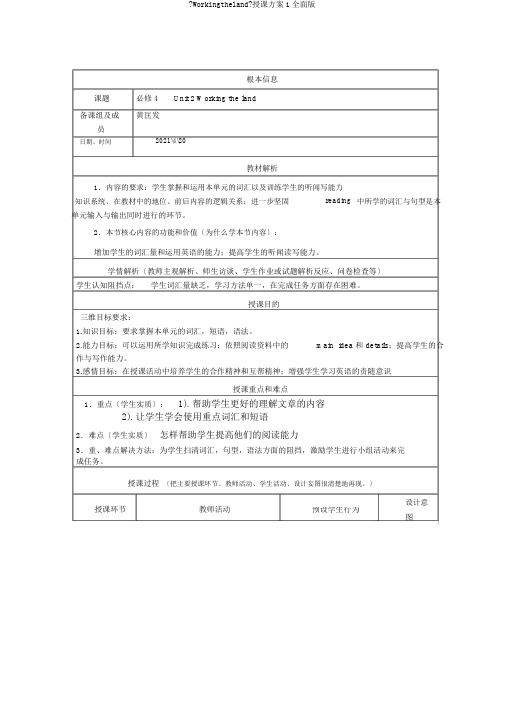
根本信息课题必修 4Unit 2 Working the land备课组及成黄匡发员日期、时间2021\4\20教材解析1.内容的要求:学生掌握和运用本单元的词汇以及训练学生的听闻写能力知识系统、在教材中的地位、前后内容的逻辑关系:进一步坚固reading中所学的词汇与句型是本单元输入与输出同时进行的环节。
2.本节核心内容的功能和价值〔为什么学本节内容〕:增加学生的词汇量和运用英语的能力;提高学生的听闻读写能力。
学情解析〔教师主观解析、师生访谈、学生作业或试题解析反应、问卷检查等〕学生认知阻挡点:学生词汇量缺乏,学习方法单一,在完成任务方面存在困难。
授课目的三维目标要求:1.知识目标:要求掌握本单元的词汇,短语,语法。
2.能力目标:可以运用所学知识完成练习;依照阅读资料中的main idea 和 details;提高学生的合作与写作能力。
3.感情目标:在授课活动中培养学生的合作精神和互帮精神;增强学生学习英语的责随意识授课重点和难点1.重点〔学生实质〕:1). 帮助学生更好的理解文章的内容2). 让学生学会使用重点词汇和短语2.难点〔学生实质〕怎样帮助学生提高他们的阅读能力3.重、难点解决方法:为学生扫清词汇,句型,语法方面的阻挡,激励学生进行小组活动来完成任务。
授课过程〔把主要授课环节、教师活动、学生活动、设计妄图很清楚地再现。
〕授课环节教师活动设计意预设学生行为图Step1. Warming up1.Ask the students whether theyhave grown any plants.if so,whatdid they do to grow them.Step2. Pre-readingTast 1 :some facts 引出课文,提高学生口语表达能力Show some pictures of hungryAfricans and some international factson hunger and poverty .1)Every 8 seconds, a childsomewhere in the world dies fromstarvation,2)More than 800 million people inthe world suffer from hunger andmany of them are fromdeveloping countries.Suggeested answers:1)We can donate some money andfood.2)We can send some children torich countries.3)The government can give themsome food for free.Tast 2 : show a picture ( Yuanlongping)Questions:1)Who is in the picture ?Period one 2)Have you heard of him ?If so , Read tell me something about him.Step3. ReadingTast 1 :prediction 1.学生说出自己种植的一两种植物,描述怎样种植,何时收获等。
Unit 2 Working the land教案
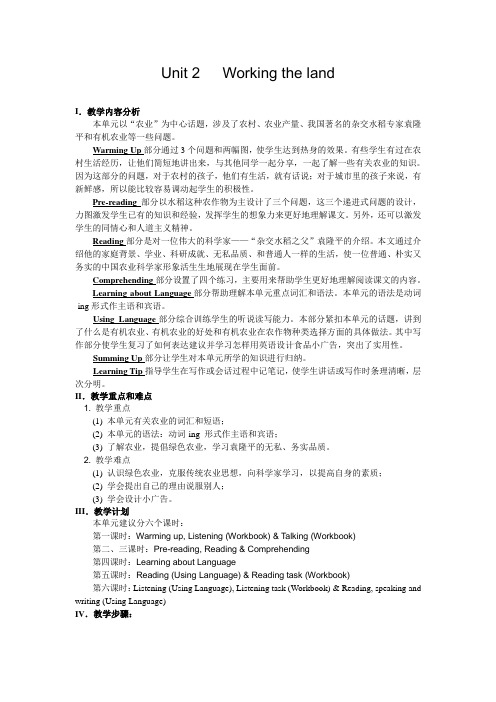
Unit 2 Working the landI.教学内容分析本单元以“农业”为中心话题,涉及了农村、农业产量、我国著名的杂交水稻专家袁隆平和有机农业等一些问题。
Warming Up部分通过3个问题和两幅图,使学生达到热身的效果。
有些学生有过在农村生活经历,让他们简短地讲出来,与其他同学一起分享,一起了解一些有关农业的知识。
因为这部分的问题,对于农村的孩子,他们有生活,就有话说;对于城市里的孩子来说,有新鲜感,所以能比较容易调动起学生的积极性。
Pre-reading部分以水稻这种农作物为主设计了三个问题,这三个递进式问题的设计,力图激发学生已有的知识和经验,发挥学生的想象力来更好地理解课文。
另外,还可以激发学生的同情心和人道主义精神。
Reading部分是对一位伟大的科学家——“杂交水稻之父”袁隆平的介绍。
本文通过介绍他的家庭背景、学业、科研成就、无私品质、和普通人一样的生活,使一位普通、朴实又务实的中国农业科学家形象活生生地展现在学生面前。
Comprehending部分设置了四个练习,主要用来帮助学生更好地理解阅读课文的内容。
Learning about Language部分帮助理解本单元重点词汇和语法。
本单元的语法是动词-ing形式作主语和宾语。
Using Language部分综合训练学生的听说读写能力。
本部分紧扣本单元的话题,讲到了什么是有机农业、有机农业的好处和有机农业在农作物种类选择方面的具体做法。
其中写作部分使学生复习了如何表达建议并学习怎样用英语设计食品小广告,突出了实用性。
Summing Up部分让学生对本单元所学的知识进行归纳。
Learning Tip指导学生在写作或会话过程中记笔记,使学生讲话或写作时条理清晰,层次分明。
II.教学重点和难点1. 教学重点(1) 本单元有关农业的词汇和短语;(2) 本单元的语法:动词-ing 形式作主语和宾语;(3) 了解农业,提倡绿色农业,学习袁隆平的无私、务实品质。
Workingtheland的教案设计
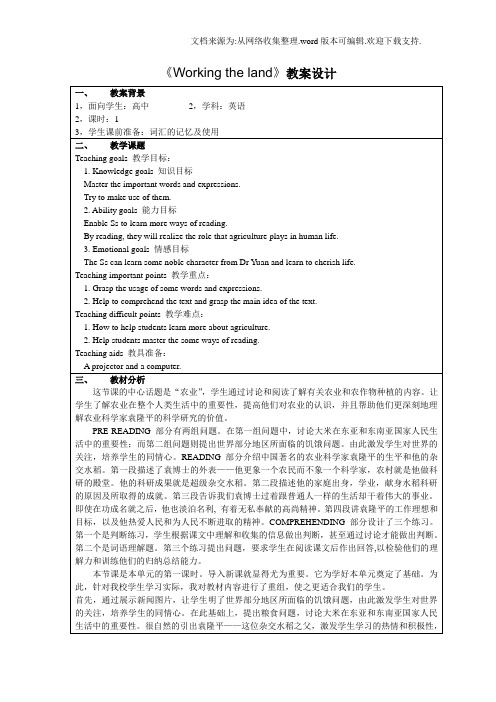
Teaching difficult points教学难点:
1. How to help students learn more about agriculture.
2. Help students master the some ways of reading.
Teaching aids教具准备:
A projector and a computer.
三、教材分析
这节课的中心话题是“农业”,学生通过讨论和阅读了解有关农业和农作物种植的内容。让学生了解农业在整个人类生活中的重要性,提高他们对农业的认识,并且帮助他们更深刻地理解农业科学家袁隆平的科学研究的价值。
《Working the land》教案设计
一、教案背景
1,面向学生:高中2,学科:英语
2,课时:1
3,学生课前准备:词汇的记忆及使用
二、教学课题
Teaching goals教学目标:
1. Knowledge goals知识目标
Master the important words and expressions.
本节课是本单元的第一课时。导入新课就显得尤为重要。它为学好本单元奠定了基础。为此,针对我校学生学习实际,我对教材内容进行了重组,使之更适合我们的学生。
首先,通过展示新闻图片,让学生明了世界部分地区所面临的饥饿问题,由此激发学生对世界的关注,培养学生的同情心。在此基础上,提出粮食问题,讨论大米在东亚和东南亚国家人民生活中的重要性。很自然的引出袁隆平——这位杂交水稻之父,激发学生学习的热情和积极性,帮助他们更深刻地理解农业科学家袁隆平的科学研究的价值。最后,通过一首唐诗《悯农》,呼吁学生珍惜粮食,热爱生活,引起共鸣。
Module 4 Unit 2 Working the land教案教学设计

Module 4 Unit 2 Working the land优秀教案教学设计设计主题Module 4 Unit 2 Working the land 阅读教学1.整体设计思路、指导依据说明依据第二言语学得和习得理论以及包天仁教授独创的英语“四位一体〞教学法理论和实践,结合当前课改理念,针对阅读课“Working the land〞,利用教学资源媒体,运用任务型教学〔Task-based teaching mode〕把这节课设计成“P—T---P〞自主学习立体模式:〔Pre—task—Task---Post-task〕。
Pre—task即在读前〔Pre—reading〕,在老师指导下,引导学生通过自主学习,完成预定任务。
Task即在课堂上以individual wok,pair work,group work,class work活动形式,通过Fast reading和Intensive reading,让学生感知、体验、商量、实践、合作与探究等方法,首先让学生到达对课文的文字理解和对课文的中心大意、段落层次有一个根本的理解。
Post-task即Post-reading,通过对文字信息加工的组织化及精加工来全面理解课文的脉络、思想内涵,并用自己的英语重新诠释课文,最后完成预定的教学目2.教学背景分析教学内容分析:本单元的中心话题是“农业〞,内容涉及我国著名杂交水稻专家袁隆平的奉献、化肥对土地耕作的影响以及开展有机生态耕种等。
本节〔本单元的第—课时〕完成“热身〞〔Warming up〕、“读前〞(Pre-reading)、“阅读〞(Reading)、“理解〞(Comprehending)四个局部.。
“热身〞〔Warming up〕局部围绕有关农业、农村和农作物种植的内容设计三组问题,让学生进行商量,相互交流他们对农业劳动的已有认识或经验。
“读前〞(Pre-reading)局部设计三个问题。
第—个问题是让学生看图和世界卫生组织的统计数据,并思考反映出来的问题?第二个问题让学生思考:如果明天突然没有了水稻将会发生什么?第三个问题让学生通过本单元阅读文章的标题和图片猜想本篇文章的大意。
Working the land教案

Working the land教案Perid3ExtensiveReadingTheGeneralIdeafThisPerid Thisperidisabutthereadingfthepassages:rganifaringItanhelpthestudentslearHelpthestudentstunderstandthepassagesandrealizetheiprtanefrganifaringHtiprvethestudents’Asing-and-anseringativitthethestudents’TeahinAulti-ThreeDiensinalTeahingAisTrainthestudents’PairrttalabutthThrughthereadingfthispassagethestudentsahaveabetterunderstandingfthea dvantagesfrganifaringItisiprtantaspeplearereandrenernedabutthequalitfthe12hetheansersftheexerisesabutthe-ingfrasthesubetandbetT:IntheReadingpartelT:Tdae’lllearnapassageabutrganifaringNpleasereadthetextandtrtfinduttheainideafe ahparagraphI’S:It’s“hatis‘rganifaring’T:That’T:ThanufrurgdansersLet’sT:Evernehasdneagdb,IhpeevernegtalltheansersburselfT:Npleasereadthepassageagain,andtrtfindalltheansersfrthefllingquestins:1hatisrganifar2TherearethreeprblesFirst,heialfertilizersaffetthesilandtheatersupplbadlSe nd,theallfarerstgrthesaerpearafterearandexhaustthesilThird,theillbthhelpfu3Farersgrpeasrsbeansafterrnrheatsthatpeasandbeansanputineralsbaintthesi l,aingitrihandhealthandreadtgrreheatrrnT:PleasAdvantagesfrganifaringReasn1Farersuse naturalastefranials1Thisaesthesilriherinineralsandsrefertile2Thesilisntexhausted2Peasandsbeansrenetheineralsinthesilanditbeesrihan dhealth3Theusethesiltbestadvantage3Theplantrpsthatneedsurfaesilandnextrpsthat gratadeeperlevel Stheindandaterdesn’tarraathesilAlltherihnessfthesilisusedT:Npleaseretellthetextardingtthefllinghart,uandisussingrupsrganifaring①aeriherandrefertile①②redueandhelpstrng②③④eepfreefrhei(Threeinuteslater,theteaherassestudentsthaveatr)TeaherexplainstheiprtantrdsandexpressinsfrthereadingTrtuseasanexaplesa spssibletillustratethepintAfterillustratin,teaherangivestudentsseexerisetnslStep7SuT:TdaelearnedapassageabutrganifaringIfuareinterestedinit,uafindreinfratin abutitntheInternetafte rlasshat’TheDesignftheritingntheBlabardUnit3ringthelandPerid3Extensivereading1redue vaesthsallerinsiz2suppl3referteghenIsaidsepepleereverstupid,Iasn’Dn’RerdafterTeahingAtivitiesandResearh TheteaheraenuragethestudentshareinterestedinrganifaringtfindreinfratinabReferenefrTeahing1red公司尽力通过减少花销提高利润。
- 1、下载文档前请自行甄别文档内容的完整性,平台不提供额外的编辑、内容补充、找答案等附加服务。
- 2、"仅部分预览"的文档,不可在线预览部分如存在完整性等问题,可反馈申请退款(可完整预览的文档不适用该条件!)。
- 3、如文档侵犯您的权益,请联系客服反馈,我们会尽快为您处理(人工客服工作时间:9:00-18:30)。
scientist.
2) Dr Yuan ‘ skind of rice id the most suitable for China ’ s
farmland.
3) Dr Yuan would rathe work than
relax
4) Dr Yuan enjoys a simpler life
than most rich and famousFra bibliotek扩展学生的
课外知识, 学
生能独立运
用 skimming
2.学生们讨论如何解决世界
饥饿问题,并提出解决的办 and scanning.
法。
在阅读中培
养学生的合
作精神, 巩固
其所学的知
识。
longping)
Questions:
1) Who is in the picture ? one 2) Have you heard of him ?If so ,
main idea 和 details;提高学生的合
3.情感目标:在教学活动中培养学生的合作精神和互助精神;增强学生学习英语的责任意识
教学重点和难点
1.重点(学生实际): 1). 帮助学生更好的理解文章的内容 2). 让学生学会使用重点词汇和短语
2.难点(学生实际) 如何帮助学生提高他们的阅读能力
3.重、难点解决办法:为学生扫清词汇,句型,语法方面的障碍,鼓励学生进行小组活动来完成 任务。
tell me something about him.
Step3. Reading
Tast 1 :prediction
1. Ask the students to skim the text
and answer some following questions
1) Who is the pioneer for all the
2.本节核心内容的功能和价值(为什么学本节内容):
增加学生的词汇量和运用英语的能力;提高学生的听说读写能力。
学情分析(教师主观分析、师生访谈、学生作业或试题分析反馈、问卷调查等) 学生认知障碍点: 学生词汇量缺乏,学习方法单一,在完成任务方面存在困难。
三维目标要求:
教学目标
1.知识目标:要求掌握本单元的词汇,短语,语法。 2.能力目标:能够运用所学知识完成练习;根据阅读材料中的 作与写作能力。
remember them.
造句
2. Translate the sentences and
use the underlined expressions
to make up sentences
Step 4 Homework Read the text and write a summary of the advantages of organic farming and the disadvantages of chemical farming.
review the new words and
词汇练习,认知单词,掌握
expressions and give them
单词的用法。
some time to ask their own
questions
Step
3
consolidation
Tast 1 :
language
学生完成相关词汇练
习,并对词汇的用法有
when they are doing organic
farming ?
4) Please say some thilngs about
organic farming.
Step 3 Reading
Tast 1; Fast reading
Questions: 1) What is organic farming ? 2) What is the goal of using
to replace the underlined
words. You may need to
change the worlds ’ forms to
fit.(Exercise 2 on page 12)
Tast 3 :
Complete the passage
with the words below in
教学过程 (把主要教学环节、教师活动、学生活动、设计意图很清楚地再现。)
教学环节
教师活动
预设学生行为
设计意 图
Period Read
Step1. Warming up
1. Ask the students whether they
have grown any plants.if so,what did they do to grow them.
somewhere in the world dies from starvation,
1.学生说出自己种植的一两 种植物,描述怎样种植,何 时收获等。 2.学生快速浏览 课文后回答 问题。
2) More than 800 million people in
the world suffer from hunger and many of them are from developing countries. Suggeested answers: 1) We can donate some money and food. 2) We can send some children to rich countries. 3) The government can give them some food for free. Tast 2 : show a picture ( Yuan
Thanks to your
support, we won the
game
3. would rather
4. Facing
the
enemies , our
soldiers would
rahter die than
surrender
Step 5 Homework
Please review the key
their
proper
forms.(Exercise 3 on
page12.)
Step 4 Sentence focus 1. devote … .to
学生用重点单词和短
语造句,掌握关键词的
用法
让学生掌握本单元的语言点
She devoted all
herself to her work.
2. Thanks to
people. Step4. Comprehending Ask the students to tell the main ideas
学生阅读课文,找出各 段落的大意
培养学生的阅读 能力,加深对课文 的理解
巩固所学知识,锻 炼学生的语 言表
教学过程(把主要教学)环节、教师活动、设计意图很清楚地再现
教学环节
Period 2
教师活动
Step1. Revision
预设学生行为 设计意图
回忆课文,加深理解
Ask students to retell the 学生用简单的语言复
text.
述课文大意
Step2.
Words and Expressions 学生复习单词, 为后面 Get the students to 的词汇练习铺路
教学反思 反思: 1、教材内容、理论、方法的认知变化,反思教学设计的落实情况,思考出现的原因和 解决方案; 2、如果重新上这节课,你的改进是?
本单元题为“保护野生动物”,阅读文是一篇作者与三种动物对话的想象 力的文章。主要的目的一是让学生理解并掌握本单元的一些重难点单词、短语 及句式;其次是培养学生的阅读能力和口头表达能力。 通过教师的指导和点拨, 检测了学生能否通过自读查读及讨论的形式来理解课文,回答课堂提问。由学 生自述处在濒危的动物引出话题。然后让学生互相讨论,处理完 “Comprehending”中的练习。最后再以“保护野生动物”为话题,进行写作训 练。
了一定的理解
让学生在一定的语境中识记
Find the wor or phrase
单词
from the text for these
meaning .(Exerxise1 on
page 12.)[
Tast 2:
Find words from the
previous pages of this unit
words and phrases for
tomorrow.
Period 3
Step1. Revision
Check the homework
Step 2 Warming up
1. show the students the 学生对所提出的问题进
让学生对
following pictures:
行小组讨论
Read the passage and answer the
four questions on page 14.
Step 4 Language point 1. find out all the sentences with
学生对动词的 -ing 形式
“ – ing ” forms,and try to 用法有了一定的理解, 并
学生探讨化学根种与有 机根种的利与弊
学生学习活动评价设计 设计评价方案,向学生展示他们将被如何评价(来自教师和小组其他成员的评价)。自我评 价表,学生自评。 From this unit you have also learned 1. useful verbs: 2. useful nouns: 3. useful adjectives: 4. other expressions: 5. a new grammar item:
